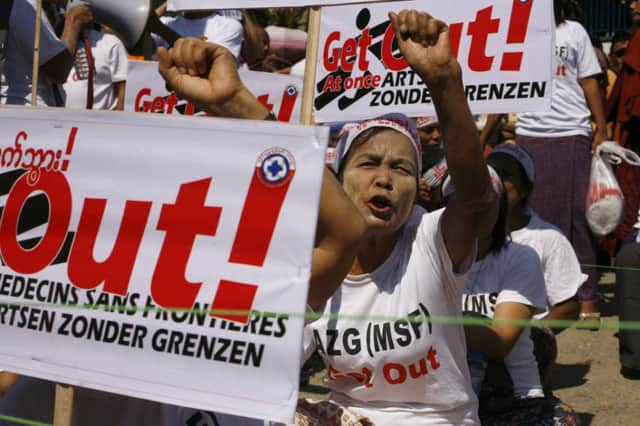Aid group ‘shocked’ at being kicked out of Burma


The move is linked to the humanitarian group’s work with the persecuted Rohingya Muslim population in Rakhine state.
The group said in a statement that it is “deeply shocked” by the decision.
Advertisement
Hide AdAdvertisement
Hide AdHIV and tuberculosis clinics in Rakhine, Shan and Kachin states, as well as the capital Rangoon, were closed, denying patients life-saving medicines, it added.
MSF is Burma’s main provider of HIV drugs, treating 30,000 people, and it described the impact as devastating.
The government recently hit out at the group over its handling of patients following an attack in the remote northern part of the state last month.
The country’s presidential spokesman Ye Htut told the Myanmar Freedom newspaper that the group’s contract in Rakhine state would not be extended because it hired “Bengalis” – the term the government uses for Rohingya – and lacked transparency in its work.
He hit out at the group over its handling of patients after an attack in the remote northern part of the state last month.
The government has denied allegations that a Buddhist mob rampaged through a village, killing women and children.
MSF said it treated 22 injured and traumatised Rohingya.
The United Nations said more than 40 Rohingya were killed. The government said only one Buddhist policeman died.
Mr Ye said the group’s “presence has more negative impact than benefit” and that its contract was not renewed because the group’s work “could heighten tension and jeopardise peace and tranquility in the region”.
Advertisement
Hide AdAdvertisement
Hide AdHalf a century of military rule has recently ended in Burma, which is a predominantly Buddhist nation of 60 million.
Since then, ethnic tensions have swept Rakhine state, raising concerns from the United States and other nations that the bloodshed could undermine democratic reforms. Up to 280 people have been killed and tens of thousands more have fled their homes, most of them Rohingya.
Since the violence erupted in June 2012, MSF has worked in 15 camps for displaced people in Rakhine state. For many of the sickest patients, the organisation offered the best and sometimes only care, because travelling outside the camps for treatment in local Buddhist-run hospitals can be dangerous and expensive.
The aid group has worked to help smooth the referral process for emergency transport from some camps.
The organisation has said its activities have been severely hampered by increasing threats and intimidation from a group of Rakhine Buddhists who have been holding near daily protests against it. The group said it has not received enough government support .
MSF has been present for nearly 20 years in Rakhine state, assisting with everything from child and maternal health to HIV, tuberculosis and malaria among all ethnic groups, including Rakhine Buddhists and Rohingya Muslims.
It has long filled a gap in Burma’s neglected and underfunded health sector.